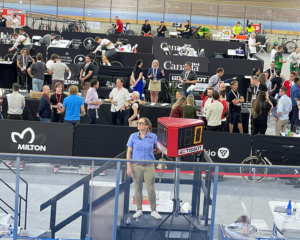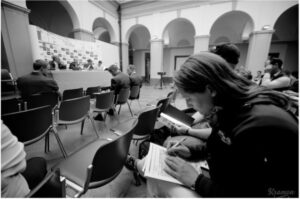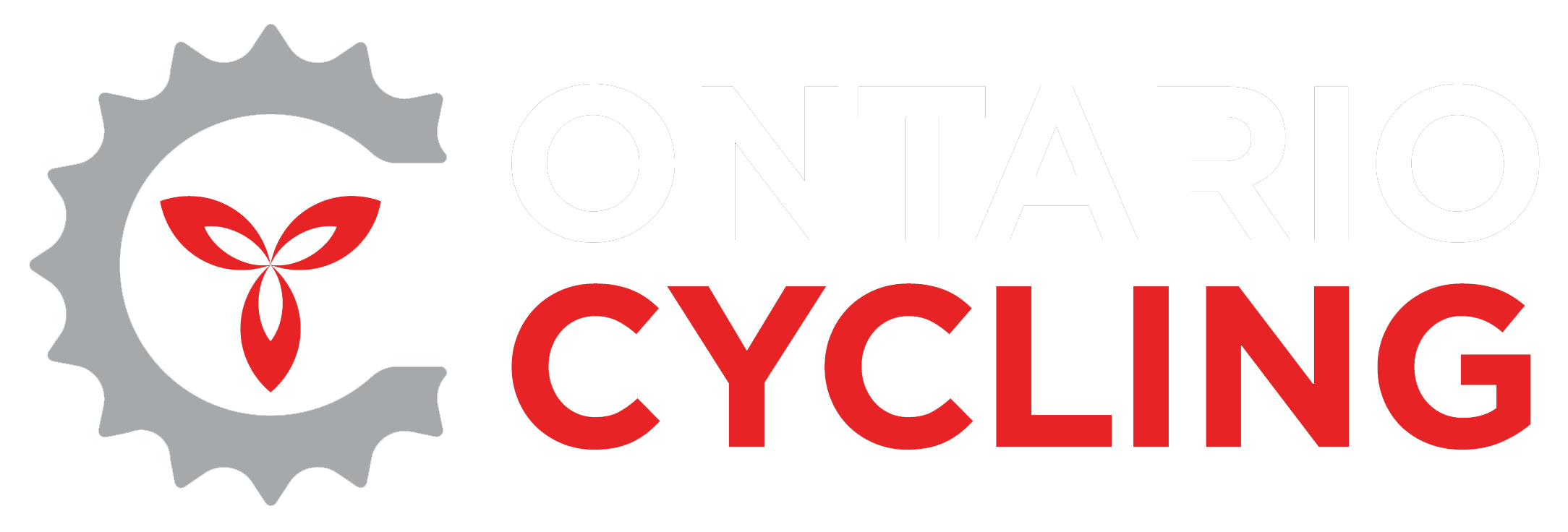Josee has been involved with cycling for 25 years – from volunteer to event organizer to coach and commissaire. She is incredibly active within the community and her professionalism and experience is impressive.
How did you get involved with cycling and why were you interested in becoming a commissaire?
I am from the Eastern Townships in Quebec. Back in the 90’s, Bromont hosted several UCI MTB World Cups and Worlds Championships. So I started as an event volunteer and the following spring I began working for the event organisation responsible to host QC and Canada MTB Cups and UCI World Cups and World Elite and Master championships.
Since that time, I have been involved in many aspects of cycling over the past 25 years. I have worked cycling event organizations, manufacturers, trade shows, professional teams, and coached athletes.
Originally, I took my first commissaire course for the road discipline in 2008 as it was a requisite to get a Sport Director’s licence. Steve Bauer and I had decided to take a local club to the next level, and for five years, we devolved what became the sole men UCI Professional Continental team of Canada to this day. Our goal and mission was to reach the World Tour level and give the opportunities to Canadian athletes to develop and reach the highest level. Hugo Houle and Guillaume Boivin were part of that team and are now racing at the World Tour, where Hugo won a stage at the Tour de France in 2022 and Guillaume a top 10 at Paris Roubaix in 2021.
As we were building towards getting a UCI World Tour team licence, other DS on the team and I took the UCI Professional Sport Director course in Switzerland, for which I became the first ever woman to be certified, at the time. But unfortunately, a few months after and 5 years of dedications in building the team; someone had decided otherwise for the future of the team, and the team was forced to stop.
Though my role as a track commissaire began a few years later. As I started to coach at the new Mattamy National Cycling Center in 2015, the need for more track commissaires was posted. A friend enticed me to do the course and I thought this was a good idea to keep my knowledge sharp.
What do you enjoy most about being a commissaire?
Fundamentally, the essence of the role of a commissaire is what I enjoy. In a similar way to building a cycling team, the commissaires contribute to the development of the sport and the athletes by providing a fair field of play. The commissaires are part of the process in an athlete’s pathway for athletic development. Furthermore, as a commissaire it is gratifying to watch over years younger athletes, who you may have officiated, evolved to international competition, and even become champions.
As well, it is rewarding to work in a team environment (commissaires’ panel) where all colleagues come from various walks of life, with diverse experiences, and all contribute together to the mission.


You are currently Provincial level A in track and a trainee in road and gravel disciplines. Do you have long term goals for your officiating career?
For over 50 years, Canadian women commissaires have been well represented at the international level, in all cycling disciplines. To some extent, back in the day, we were avant-garde and among the pioneers of women commissaires at the international level. The first ever woman commissaire at the Tour de France is a Canadian.
While working with the team and other various cycling organizations, I had the opportunities to meet and work with several of them at local and UCI races, at home and abroad.
Over time, these women have influenced directly and indirectly my decision in continuing my track officiating pathway.
I intend to become national elite track commissaire, and aspire to continue further, should I receive the opportunity to become an international UCI commissaire.
As for the road and gravel disciplines, I have never officiated at any events, as my focus has always been to work with events and team organizations. As an event organizer, a coach and a sport director, I believe having a fair knowledge of the regulations and keeping up to date with the rule changes is essential.
What advice would you give to someone who might want to become a commissaire?
Being excited about cycling is definitely key, but the willingness to learn and understand the regulations is primordial.
Also understanding that a commissaire is not there to make its own rules or be in a position of power. We are there to ensure the regulations issued by the governing bodies (UCI and the national and provincial sport organizations) are applied accordingly to standard of practice, with the least interference to the competition progress.
With various event levels, will come different roles from grassroots awareness to higher standard expectations at championships and international competitions. As long as you wish to contribute to the sport, there is a role that awaits for anyone.
